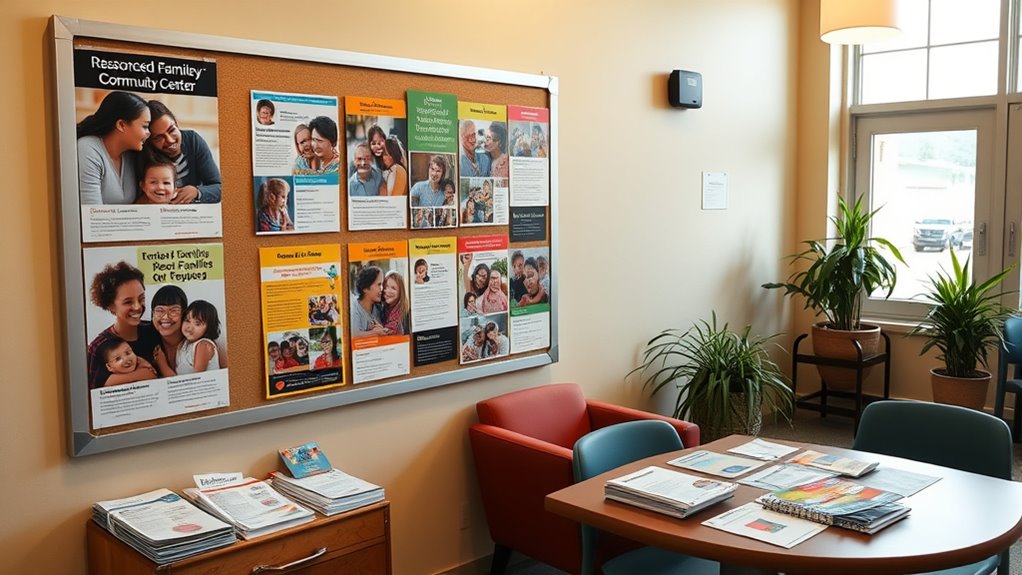A blended family support resources directory provides essential tools and guidance to help you manage the unique challenges of stepfamilies. You’ll find organizations offering counseling, online platforms with affordable therapy options, and support groups where you can connect with others experiencing similar struggles. These resources help improve communication, resolve conflicts, and foster family cohesion. Exploring these options can make your blended family journey smoother—keep going to discover even more helpful resources designed for your family’s success.
Key Takeaways
- Online therapy platforms and directories connect families with specialists experienced in blended family dynamics.
- Support organizations like Parentline Plus offer resources, counseling, and helpline services for blended families.
- Community support groups provide peer advice, shared experiences, and emotional support for blended family members.
- Educational websites and articles offer practical tips on communication, conflict resolution, and family cohesion.
- Local family counseling centers and mental health clinics often provide tailored support for blended families.

Are you steering the unique challenges of a blended family? If so, you’re not alone. Nearly 40% of families in the U.S. are blended, meaning at least one partner has children from previous relationships. With around 16% of children living in such families, the landscape is more common than you might realize. Every day, between 1,300 and 2,100 new blended families form, highlighting how dynamic and evolving this family structure is. Despite these numbers, the number of children living in blended arrangements has stayed relatively steady over recent decades. *Fascinatingly*, children from Asian backgrounds are less likely to be part of a blended family compared to Hispanic, Black, or white children, influenced by cultural and demographic factors. Children from Asian backgrounds are half as likely to live in blended families, reflecting different cultural norms and family traditions.
Nearly 40% of U.S. families are blended, with children from Asian backgrounds less likely to be part of such families.
Navigating this family setup comes with its set of challenges. Jealousy and rivalry among stepsiblings or half-siblings are common issues you might face, often fueled by territorial disputes over space and belongings. Adjusting routines, schedules, and expectations can feel overwhelming for children, especially as they adapt to new family dynamics. Miscommunication and co-parenting disagreements frequently add stress, making it difficult to establish a cohesive environment. Sometimes, children may feel unseen or unheard, which can lead to anxiety or depression if not addressed properly. Sibling rivalry can also intensify if children feel compared or pitted against each other, complicating relationships further. Recognizing the importance of family cohesion can be a helpful step in overcoming these difficulties.
Fortunately, there are abundant resources designed to support families like yours. Many families benefit from therapy—be it individual, couples, or family sessions—to improve communication, resolve conflicts, and foster closer bonds. Online therapy platforms have made accessing professional help easier and more affordable, giving you more options to find guidance tailored to your family’s needs. Support organizations like Parentline Plus receive over 100,000 calls annually from families seeking advice on blended family issues, showing how widespread these struggles are. Online directories can help you locate therapists who specialize in blended family dynamics, giving you access to expert advice. Books, articles, and educational materials also offer valuable insights into managing complex relationships, setting realistic expectations, and developing healthy communication skills.
Support groups can provide a sense of community, letting you share experiences with others facing similar situations. These groups often serve as safe spaces to exchange advice, encouragement, and practical tips. Demographic factors influence how blended families form and function, with children from Hispanic, Black, or white backgrounds more likely to be part of blended arrangements compared to Asian families, whose cultural norms may shape family structures differently. Overall, understanding and utilizing these resources can help you better navigate the hurdles of blended family life. By actively seeking support and staying informed, you can foster a more harmonious environment where every family member feels valued and heard.
Frequently Asked Questions
How Can I Find Local Blended Family Support Groups?
You can find local blended family support groups by checking online platforms like Meetup and Psychology Today, which list specific groups like Stepmom Support. Visit community centers and family resource centers in your area, as they often host support groups. You can also explore local support directories or ask your therapist for recommendations. Many groups offer virtual options, making it easier to connect regardless of your location.
Are There Online Counseling Options for Blended Families?
Think of online counseling for blended families as a bridge connecting your complex family landscape. You can access platforms like BetterHelp or ReGain, offering therapy tailored for your unique challenges. These sessions help you navigate ex-partners, step-siblings, and co-parenting, all from your home. With proven effectiveness comparable to in-person therapy, online options make it easier to attend, engage, and strengthen your family bonds amidst busy schedules.
What Legal Resources Are Available for Blended Family Disputes?
You have several legal resources for blended family disputes. Family law attorneys can guide you through custody, support, and guardianship issues, ensuring your rights are protected. Mediation offers a peaceful way to resolve disagreements without court battles. Estate planning tools like wills and trusts help clarify inheritance intentions. Using these resources proactively can prevent conflicts, clarify expectations, and provide enforceable solutions tailored to your family’s unique needs.
How Do I Navigate Co-Parenting Challenges?
Did you know that about 40% of U.S. families are blended? To navigate co-parenting challenges, focus on open communication about expectations and concerns, which builds understanding. Enforce consistent rules, spend quality time with your children, and establish clear roles for everyone involved. Don’t hesitate to seek counseling for support. These strategies foster stability, reduce conflicts, and strengthen your family bonds amid the complexities of blending families.
Are There Financial Planning Resources Specific to Blended Families?
Yes, there are financial planning resources specific to blended families. You can find detailed online guides on estate planning, tax considerations, and budgeting tailored for your situation. Financial firms like Merrill and PNC offer consultations and whitepapers, while community seminars and nonprofit organizations provide educational events. Use forums like MoneyGeek to connect with others, learn practical strategies, and build trust, ensuring your family’s financial stability and harmony.
Conclusion
Guiding a blended family can feel like steering a boat through choppy waters, but with the right support, you’ll find steady footing. This directory offers valuable resources to guide you along the way, helping you build stronger bonds and create a harmonious home. Remember, you’re not alone on this journey—like a lighthouse shining through the fog, these tools can light your path to a happier, more connected family life.










